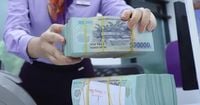The new U.S. tariff policy is gradually leaving clear impacts on the Vietnamese economy, especially in import and export. As the 2025 Annual General Meeting (AGM) season peaks, the story of the level of impact and response scenarios of banks has become a major concern for investors.
Representatives of large state-owned banks such as Vietcombank, BIDV, and VietinBank all acknowledge that the new tax policy will create significant pressure on corporate customers with strong export activities to the U.S., thereby posing indirect risks to credit growth. Nguyen Thanh Tung, Chairman of the Board of Directors of Vietcombank, noted that the impact from U.S. tariffs will be clear because the bank accounts for about 20% of the market share of international payments and financing trade throughout the market.
Many of Vietcombank's customers are businesses exporting to the U.S. in fields such as electronics, wood, seafood, and plastics—all of which are industries easily affected by high tax policies. Vietcombank's FDI customer portfolio is large compared to other banks, accounting for more than 20% of the total wholesale debt balance, over 40% of total capital mobilization, and more than 50% of international accounting revenue for trade finance.
To respond, Vietcombank has proactively coordinated with customers to come up with solutions to minimize the impact, including financial support and diversifying export markets. At the AGM, Mr. Phan Duc Tu, Chairman of the Board of Directors of BIDV, stated that the U.S.-China trade war is not expected to have a significant impact on the bank. BIDV estimates that a total outstanding debt affected is approximately 300,000 billion VND, accounting for 15% of total outstanding debt, concentrated in the steel, plastic, mechanical, seafood, leather shoes, textiles, logistics, and industrial park real estate industries.
The trade war is forecast to affect credit, capital mobilization, and asset quality, leading to a decline in profits. The bank plans to set aside a provision of about 21,000 billion VND in 2025, equivalent to the level implemented in 2024. According to Tran Minh Binh, Chairman of VietinBank, the bank has not yet included the impact of U.S. tariffs in its 2025 business model due to difficulties in quantifying the specifics. However, the bank has built unfavorable scenarios and appropriate response plans.
It is forecast that credit growth in 2025 will be more difficult than in 2024, but VietinBank still maintains a stable growth rate. Binh affirmed, "We are committed that VietinBank's 2025 business results will be very impressive compared to 2024." Meanwhile, at LPBank, Deputy Chairman Bui Thai Ha reported that, although U.S. tariff policies have significantly affected the import-export business activities of Vietnamese businesses, LPBank has only 0.3% of credit debt related to affected businesses.
Right from the beginning, LPBank's executive board organized meetings to assess, compile statistics, and come up with response solutions, including the establishment of an asset management company (AMC). Mr. Nguyen Hung, General Director of TPBank, also stated that the bank has about 10,800 billion VND in outstanding debt from import-export customers related to the U.S. market. For these customers, import-export revenue accounts for less than 20% of their total revenue, so the level of impact is not significant.
TPBank has conducted thorough reviews of new credit loans, especially with businesses exporting items easily affected, such as seafood to the U.S. For FDI businesses, TPBank mainly provides payment services, foreign exchange trading, and other support services, but does not participate in lending. Generally, FDI businesses borrow capital from foreign banks such as Korea or Taiwan (China), so credit risk from this group to TPBank is almost nonexistent.
MSB Bank also appeared relatively optimistic, with General Director Nguyen Hoang Linh stating that in the context of unpredictable U.S. tariff policies, MSB has focused on risk management. The bank's total outstanding debt reached 191,000 billion VND, with industries such as wood, basa fish, cameras, chemicals, and cashew nuts accounting for approximately 3,900 billion VND, equivalent to 9.5% of total outstanding debt. MSB has reviewed the operating capacity of customers in these industries and is currently controlling the situation relatively well.
In the worst-case scenario, the non-performing loan ratio of this group could reach 2.3%, while the bank's overall non-performing loan ratio will be maintained at approximately 1.8%. HDBank also recorded a low level of impact, with customer debt directly related to the U.S. market being below 1.5%. General Director Pham Quoc Thanh shared that HDBank has implemented a balanced risk management policy and diversified its portfolio to deal with the impact from tariffs.
The bank has also adjusted its financing policies and support structures for affected customers. With a capital adequacy ratio (CAR) of 14.85%, HDBank has enough capacity to withstand market fluctuations. The bank is confident in its ability to achieve growth targets while expanding financing for projects and consumption.
HDBank has also registered to participate in the Government's 500,000 billion VND credit package, committing to support 20,000 billion VND for infrastructure and technology businesses. Regarding the U.S.'s tariff measures, Vietcombank Securities (VCBS) stated that the banking industry will be indirectly affected when the income of related businesses decreases, impacting debt repayment cash flow and credit demand.
However, VCBS experts assessed that the impact is not too great because total outstanding export loans only account for over 5% of total outstanding debt in the entire system or FDI debt accounts for about 2%. As for the recent announcement of a 90-day tariff suspension, experts believe this will stimulate economic activities in Vietnam, leading to positive impacts on the banking sector. The 90-day period will provide banks and customers with the necessary time to develop strategies and proactively take actions to strengthen business operations and financial positions against tariff risks.




